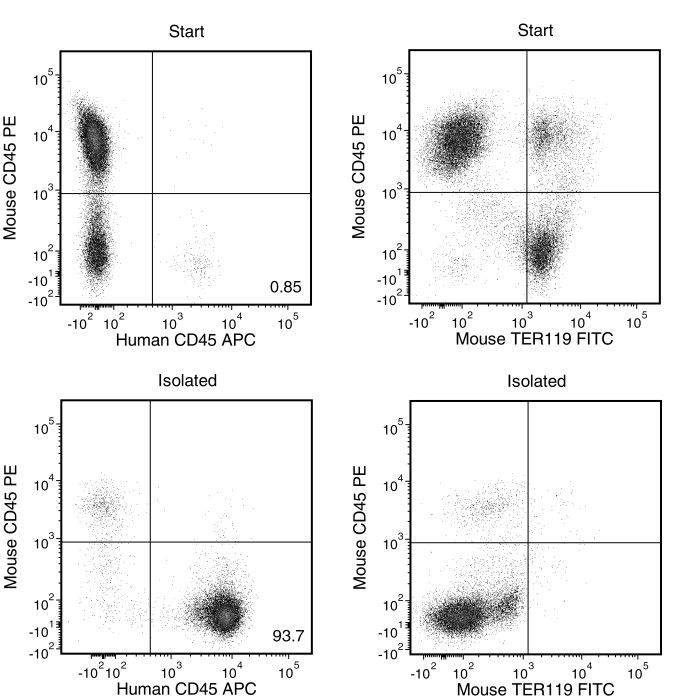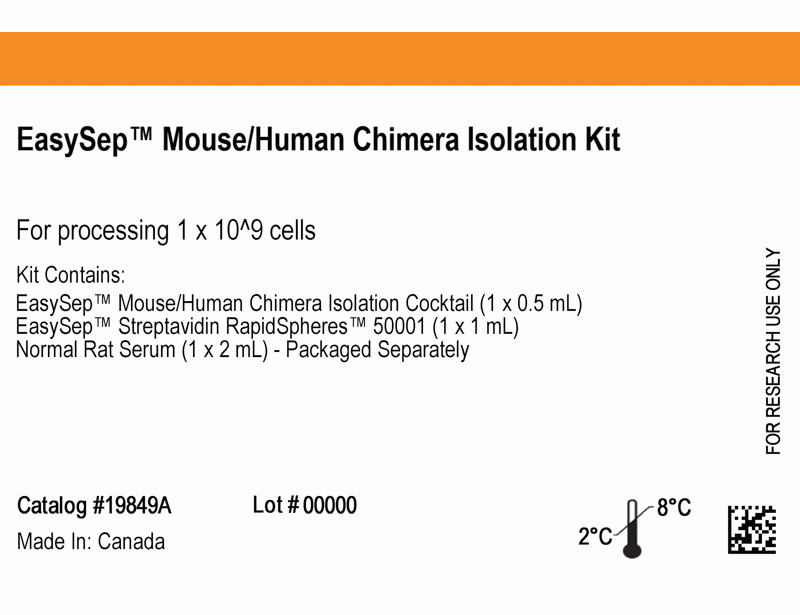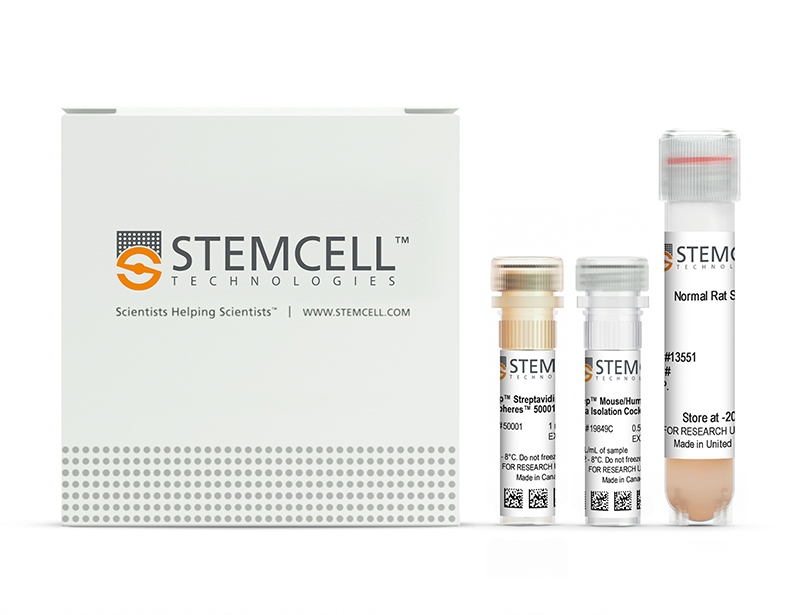概要
The EasySep™ Mouse/Human Chimera Isolation Kit is designed to highly enrich human cells from bone marrow, spleen or peripheral blood of human xenograft recipient mice by negative selection. Unwanted cells are targeted for removal with biotinylated antibodies directed against mouse hematopoietic cells and streptavidin-coated magnetic particles. Labeled cells are separated using an EasySep™ magnet without the use of columns. Desired cells are poured off into a new tube.
This product can be used in place of the StemSep™ Mouse/Human Chimera Enrichment Kit (Catalog #13068) for faster, easier cell isolations.
This product can be used in place of the StemSep™ Mouse/Human Chimera Enrichment Kit (Catalog #13068) for faster, easier cell isolations.
技术资料
| Document Type | 产品名称 | Catalog # | Lot # | 语言 |
|---|---|---|---|---|
| Product Information Sheet | EasySep™ Mouse/Human Chimera Isolation Kit | 19849 | All | English |
| Safety Data Sheet 1 | EasySep™ Mouse/Human Chimera Isolation Kit | 19849 | All | English |
| Safety Data Sheet 2 | EasySep™ Mouse/Human Chimera Isolation Kit | 19849 | All | English |
| Safety Data Sheet 3 | EasySep™ Mouse/Human Chimera Isolation Kit | 19849 | All | English |
数据及文献
Data

Figure 1. Typical EasySep™ Mouse/Human Chimera Isolation Profile
In the above example, human peripheral mononuclear cells (PBMCs) are seeded into mouse bone marrow at an average starting frequency of 1.85%. The human PBMC content of the isolated fraction is 80 - 98%. Typically 3 - 4.5 log depletion of targeted mouse CD45+ is attained.
Publications (2)
Leukemia 2020 jun
Despite mutation acquisition in hematopoietic stem cells, JMML-propagating cells are not always restricted to this compartment.
Abstract
Abstract
Juvenile myelomonocytic leukemia (JMML) is a rare aggressive myelodysplastic/myeloproliferative neoplasm of early childhood, initiated by RAS-activating mutations. Genomic analyses have recently described JMML mutational landscape; however, the nature of JMML-propagating cells (JMML-PCs) and the clonal architecture of the disease remained until now elusive. Combining genomic (exome, RNA-seq), Colony forming assay and xenograft studies, we detect the presence of JMML-PCs that faithfully reproduce JMML features including the complex/nonlinear organization of dominant/minor clones, both at diagnosis and relapse. Further integrated analysis also reveals that although the mutations are acquired in hematopoietic stem cells, JMML-PCs are not always restricted to this compartment, highlighting the heterogeneity of the disease during the initiation steps. We show that the hematopoietic stem/progenitor cell phenotype is globally maintained in JMML despite overexpression of CD90/THY-1 in a subset of patients. This study shed new lights into the ontogeny of JMML, and the identity of JMML-PCs, and provides robust models to monitor the disease and test novel therapeutic approaches.
Molecular therapy : the journal of the American Society of Gene Therapy 2019 nov
Genetically Engineered Cell-Derived Nanoparticles for Targeted Breast Cancer Immunotherapy.
Abstract
Abstract
Exosomes are nanosized membranous vesicles secreted by a variety of cells. Due to their unique and pharmacologically important properties, cell-derived exosome nanoparticles have drawn significant interest for drug development. By genetically modifying exosomes with two distinct types of surface-displayed monoclonal antibodies, we have developed an exosome platform termed synthetic multivalent antibodies retargeted exosome (SMART-Exo) for controlling cellular immunity. Here, we apply this approach to human epidermal growth factor receptor 2 (HER2)-expressing breast cancer by engineering exosomes through genetic display of both anti-human CD3 and anti-human HER2 antibodies, resulting in SMART-Exos dually targeting T cell CD3 and breast cancer-associated HER2 receptors. By redirecting and activating cytotoxic T cells toward attacking HER2-expressing breast cancer cells, the designed SMART-Exos exhibited highly potent and specific anti-tumor activity both in vitro and in vivo. This work demonstrates preclinical feasibility of utilizing endogenous exosomes for targeted breast cancer immunotherapy and the SMART-Exos as a broadly applicable platform technology for the development of next-generation immuno-nanomedicines.

 网站首页
网站首页



